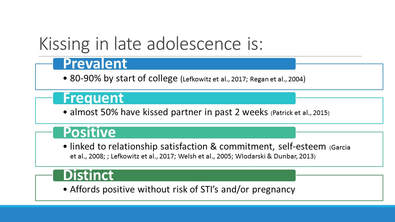A few weeks ago I wrote about our paper considering what distinguishes first year college students who have never kissed a partner from students who have. We followed up that paper by examining daily associations between kissing and affect in the same sample. Our examination of kissing and affect was motivated by a normative developmental framework, and an interest in understanding the value of kissing during adolescence and the transition to adulthood. We know that kissing is a meaningful and important experience for several reasons.
We found that kissing was associated with affect at the daily level – students reported more positive and less negative affect on days they kissed compared to other days. This association existed even after controlling for a number of known correlates of affect, such as vaginal sex, weekend days, relationship status, and demographic factors. A number of control variables were also associated with affect, which we describe in detail in the paper.
Thus, our findings demonstrate that it is not simply that students who tend to kiss more frequently have more positive well-being. Instead, it’s that on days when students kiss a partner, they experience more positive and less negative affect. These findings inform comprehensive sex education, suggesting that such programs could incorporate an emphasis on the value of kissing as an alternative to vaginal sex if individuals do not feel emotionally ready, or do not have the means to adequately protect themselves from STI’s or unintended pregnancy.
“Late Adolescents Are Happier on Days They Kiss first appeared on Eva Lefkowitz’s blog on September 11, 2018.”


 RSS Feed
RSS Feed
